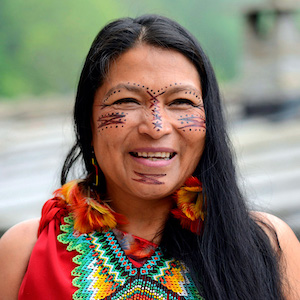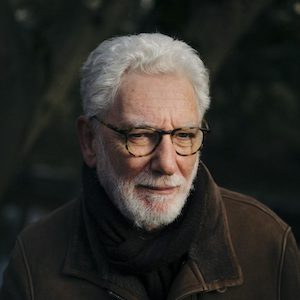
SALSA 2025 Keynote Dialogue
Keynote Dialogue
SALSA 2025 Biennial Conference
University of Helsinki
Shuar poet, intellectual and presenter Maria Clara Sharupi Jua has accepted our invitation to dialogue with Philippe Descola for the Keynote Dialogue at the SALSA XV Biennial Conference.
Maria Clara Sharupi Jua
Maria Clara Sharupi Jua (1964) was born in Sevilla Don Bosco, in the province of Morona Santiago, Ecuador, and is a member of the Shuar Nation. In her poetry and prose, she seeks to transmit the magic of nature, the universe, and the ancestral wisdom found in Shuar cosmology. She is the co-author of several books, including Amanece en nuestras vidas (2011), Collar de historias y Lunas (2012), My Voice (2014), and Sin Alegría no hay esperanza (2021).
During the pandemic she has written articles for the EURAC Institute (2019), given talks on diversity among the Shuar and ancestral architecture at universities in Nashville and Temuco (2021), and received the “Aurelio Espinoza Pólit” Award for literary accomplishment (2021). She has also worked as a translator and a radio/television presenter in her language, Shuar Chicham, and in Spanish. Her verse collection Tarimiat (2019) was published in bilingual Shuar Chicham/Spanish edition. She is a human rights activist who works in the field of cultural rights and towards the eradication of violence against women.
Philippe Descola
Philippe Descola, Professor Emeritus at the Collège de France, was born in Paris in 1949. He initially studied philosophy at the École normale supérieure de Saint-Cloud, before going on to train in ethnology at the Université Paris-X and the École pratique des hautes études (VIe section). Charged with a mission by the CNRS, he carried out an ethnographic survey from 1976 to 1979 among the Achuar Jivaros of the Ecuadorian Amazon, studying in particular their relationship with the environment, the subject of his doctoral thesis in ethnology, which he defended in 1983 under the supervision of Claude Lévi-Strauss.
After teaching at the University of Quito, he became a visiting scholarat King’s College Cambridge and a research associate at the Maison des Sciences de l’Homme, before joining the École des Hautes Études en Sciences Sociales (maître de conférences in 1984, directeur d’études in 1989), where over the years he developed a comparative anthropology of relations between humans and non-humans during his weekly seminar.

